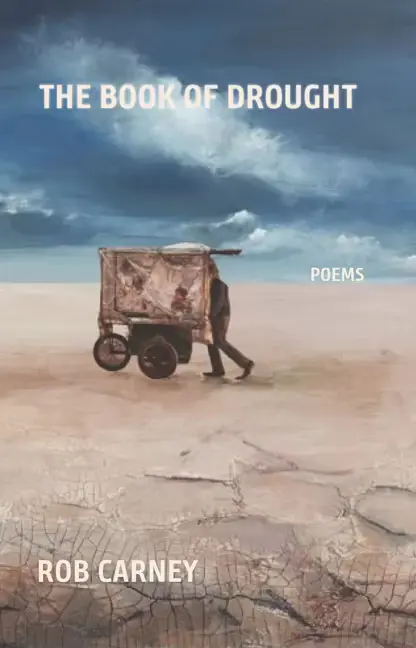Book Review: The Book of Drought
Art
The Book of Drought
Rob Carney
TRP: The University Press of SHSU
Street: 09.01
It isn’t easy to realistically think about—let alone write about—climate change without succumbing to paralyzing despair. But in his newest, award-winning poetry collection, The Book of Drought, local poet and educator Rob Carney manages to take a clear-eyed look at the worrying state of the environment, instill fresh faith in community action and point the way toward a more hopeful tomorrow.
Carney dons the persona of a small community’s scribe in a future where all the lakes and rivers have dried, the forests have burned to the ground and humans are forced to make do with less of everything. “They held a vote,” he states in one of the early poems. “I’m the one they elected / to be the Listener and Reservoir and Scribe— / the one who records this.” The purpose of his recording, he tells us, is to help people remember where they’ve been, to encourage them to imagine what might be and to leave a record for those who come after.
Across 70 or so pages of conversational, free-verse couplets (with a few well-placed spurts of iambic pentameter), Carney builds a world where children go thirsty, desiccated lake beds spew toxic dust storms in high winds and only the adults remember everyday joys like fishing, looking at flowers and shoveling snow. The oldest in the community tell Carney’s narrator what they’ve lost, while the youngest grieve at what they never had the chance to know. “Dear before, when I wasn’t even born yet,” one child writes in a heartbreaking letter which the narrator shares with us. “How come you used up everything?”
The sorrow and rage of these passages is palpable, largely due to Carney’s mastery of characterization and voice. Whether he’s recounting an anecdote told by a little girl, an angry teenage boy or a woman who is bitterly relieved her sister didn’t live to see what the world became, he’s able to imbue each with unique idioms and speech patterns that make them feel like real people.
And while The Book of Drought doesn’t shy away from portraying the bereavement which could soon be ours, it’s much more than an elegy for what we all may lose. The profound misery and dispossession are only a starting place for Carney’s narrator, not the finish line. As he states in the book’s fifth section, “Everyone’s sick of the wreckage. / They want to remember why it matters / in case it ever rains.” Carney knows that people need to believe there’s a reason to persist, especially in difficult times.
From here, he shows us the path forward, and it isn’t to simply wait (or pray) for the rains to return. The hope for the future is found through building communities, amplifying voices the powerful ignore, fostering imaginative wonder and refusing to forget the grandeur we’ve misused. None of this is ever conveyed in didactic political speech, though. Carney is much too good a poet for that.
Instead, he employs his skills as a fabulist and mythmaker to get his message across. In one poem, for example, he writes about a bear who lays claim to a river as if it belongs to him, ultimately draining it completely. This image holds a troubling mirror up to human greed. In another poem, a heron tries to teach people a needful lesson in stillness and contentment, which they ignore to their detriment. And, in one of the collection’s most beautiful fables, he writes a list of begets (à la the Book of Genesis) that draws a throughline from nature to humanity, and from humanity to the hope of tomorrow.
If we’re wise enough to work for it, that is.
As Carney writes multiple times in the book, “the sky gave the Future as a gift: / But it didn’t say what kind.” The first time these lines appear, they carry an immense regret toward how past generations squandered their gift. When they appear at the end, though, they convey that tomorrow is still ours to shape. Even if the worst projections of what the climate will look like a scanty few years from now come true, there’s still hope that together we can learn to properly use the gift of life on this earth.
As with any book of poetry, you can only get so much from a summary of its themes and techniques, so I highly recommend you read The Book of Drought yourself. By feeling your way through its simple yet musical lines, you may very well find genuine catharsis for your climate anxiety and a little resolve for the effort the environmental crisis requires. I know I did. The Book of Drought is Rob Carney’s ninth book of poems, and it won the 2023 X. J. Kennedy Poetry Prize. You can purchase your copy through the Texas A&M University Press website. And if you like The Book of Drought, you should peep Carney’s online series of poems, fables and essays called “Old Roads, New Stories.” –Joe Roberts
Read more reviews here:
Film Review: The Deliverance
Review: Fontaines D.C. – Romance

